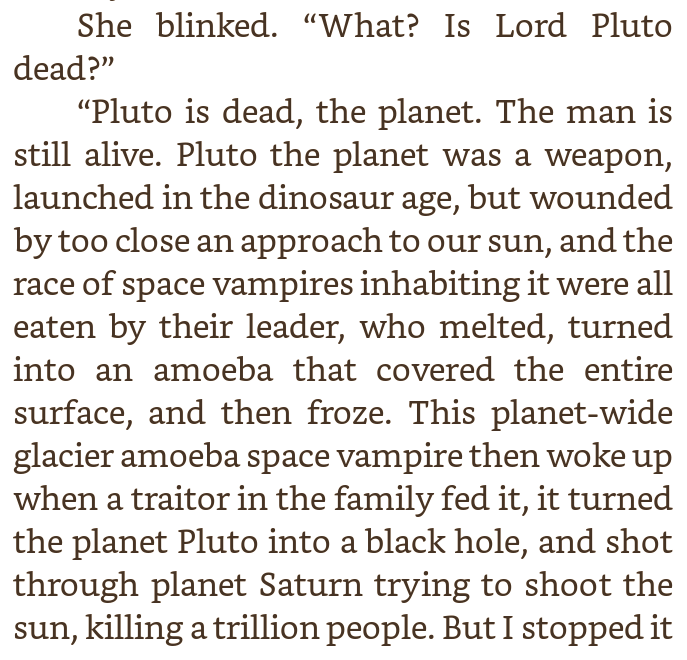 The action picks up right where The Lords of Creation left off. Once again John C. Wright delivers a family drama and political thriller wrapped up in a far-future where the advanced tech borders on magic and the threats around the galactic corner are far worse than the threats from within the family tree.
The action picks up right where The Lords of Creation left off. Once again John C. Wright delivers a family drama and political thriller wrapped up in a far-future where the advanced tech borders on magic and the threats around the galactic corner are far worse than the threats from within the family tree.
Perhaps not worse, but they certainly have for more disastrous consequences in mind for the teeming trillions of men who live in our solar system than the mere slavery under one Solar Emperor that the Lords of Creation seek. The menace that faces humanity deepens as the story progresses, and even the most implacable internecine foe realizes that he can never rule humanity while space vampires threaten.
As usual, Wrights writing is top notch. The dialogue clips along with nary a wasted word, and the descriptive text helps set the scene without becoming part of it. His pacing is masterful, lingering when necessary over intricate passages, then dropping the purple prose in favor of impactful terseness. The stakes rise throughout the book, and the pressure to act, so confront what needs to be confronted, bears a heavy toll on everyone involved in the fight against the spacefaring undead.
Since this is the second novel in the trilogy it’s worth warning those who have not read The Space Vampires that spoilers follow below the fold. Appropriately enough given the subject matter, we’re going to start the spoilers with a bang…
This one passage could sum up a whole trilogy of its own in the hands of a lesser writer.

That’s just the tip of the amoeba iceberg, a brief excursion into the distant past of Wright’s Superluminary universe, and the lingering effects of the vampire enemy’s epic plot to rid the galaxy of life. From here, Wright glibly slips away form the shock and awe of quantum-bombs and planetary rings of corpses that spin up to produce death rays capable of detonating stars. Instead, the focus shifts to a debate on the nature of command, and the flaws of democracy. We begin to understand the need, when faced with such inhuman and massive-scaled threat, for a quick and decisive leader. The hero we first liked because of his naïve trust in democracy must learn to accept that his mastery of the Final Science burdens him with obligations that he dare not set down – even that of ruling the terrified and on-the-run horsed of humanity.
But this is space opera after all, so once the pontificating and politicking has given the reader a chance to breathe, Wright brings back the whammies. Our solar system and all its trillions of surviving humans flee from the vast armada bent on the destruction of life straight into the mouth of the wolf. Not content to fling the nine solar planets half-way across the vast emptiness of space, Wright casually tosses them all into the heart of the universe’s largest star in a desperate attempt to turn the power of the enemy Dyson-sphere-lasers against the pursuing armada.
Yeah. The action just keeps getting bigger and bolder.
Expanding on the universal, and universal in the literal sense of “filling the entire universe” threat of the forces of anti-life, the reader gets a look at things from the perspective of the villains of the piece. With his usual panache, Wright manages to describe the ultimate emperor of anti-life and his highest ranking generals as alien in a way that brings their motivations and interactions back down to an almost human scale. Not quite human, but near enough to allow for our limited minds to grasp the sheer hatred for life they possess, and the scale on which they operate.
As usual, the comments here at Castalia House are worth reading; in response to my review of The Lords of Creation, Nathan pointed out this trilogy was originally published as a weekly serial. The seams are invisible when they are joined together as a full narrative, but of far more import was Nathan’s point that with Superluminary, John C. Wright was clearly attempting to wrest the title of “World Wrecker” away from the pulp master, Edmon Hamilton. Drawing on the latest science and speculation about our universe, John C. Wright successfully manages to bring Hamiltonian-scale devastation into the literature of the 21st century. Only the passage of the years can say whether or not his work will stands the test of time with as much grace as Hamilton’s work. Given the perfect marriage of Wright’s character-scale drama with his planet-busting action, you’d be a fool to bet against him.
Please give us your valuable comment